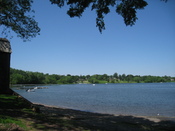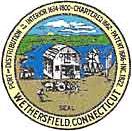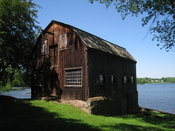American society was changing rapidly. Slavery was becoming more common in the South, and different areas and colonies had developed and adapted their own system of government. Breaking apart from Britain was the final step in a series of democratic actions. Without pursuing freedom, individual rights, and an obviously capitalistic society from the beginning, America would never have been created. Using Wethersfield, Connecticut as an example, American society was becoming more democratic between 1750 and 1790 in accordance with property distribution, social structure, politics, and religion.
In early New England society, the government was built on small towns, and citizens relied on their own farms as well as others' farms. In addition, religion was important, because Connecticut had a large Puritan Separatist population, who were known for their religious piety. Between the 1750s and 1780s, many events occurred that led to the American Revolution, one of the most important being British negligence.
The English king had to deal with internal problems, and therefore had to ignore his position in America. When America had already developed its own trade system and learned to live without Britain, Britain decided to take over its "child"� again, but Americans would not have it because they were their own country now. Upset colonists led to the breaking away of America, and thus to the writing of the Declaration of Independence. Subsequently, the American Revolution was a result of a more democratized nation.
Property distribution in Wethersfield became more equal. In America, agriculture was the prime source of money and a part of every person's lifestyle. Owning land was a very important thing, but farms had to be close to a town in order to survive. However, since towns were so small in early America, the farms became closer and closer together, making it hard for people to attain larger farms. Most people had between 1-150 acres. There were only a couple landowners that had more than this. While the owners of larger amounts of land obviously became richer, land distribution continued to become more equalized. Therefore, this made Wethersfield more democratic because more parity of land division made the people more equal in the eyes of the government and in the eyes of the other townspeople, and equality is an important part of a democratic government.
As in land distribution, people in Wethersfield became more equal in terms of social structure as well. As more people lower in social structure became more involved in political affairs, they began to look out for their own class's interests. The division between the classes began to grow less, not more, ambiguous. However, social equality is an ideology that has yet to be put into American society. American society is, in fact, founded on competition where the "winners"�, the largest money-makers, are in the top social class and those lower on the social ladder were the "losers."� This is the basis of capitalism; the principle America was founded on. Therefore, democracy in America was on a rise in reference to social structure because while classes in America were and still are divided, each class is still represented in the government.
In terms of politics, more people from different classes became more active. In general, activity in politics increased in New England during this time because of increased interest of breaking away from Britain, especially in the 1780s. In Wethersfield, more members of the middle class were elected to town offices. In 1756, most representatives came from the top ten percent wealthiest people in the community, and all representatives were in the top fifty percent. In 1756, two thirds of the people elected to town offices were not in the top ten percent wealthiest people in Wethersfield. 13 of those officials were in the seventieth or lower percentile of wealth. Additionally, since more "common"� people were in the local government, the people were being represented more accurately. As a result, democracy was increasing because the people were represented more precisely in Wethersfield's' government.
In terms of religion, American society in Wethersfield was become more egalitarian during the time before the American Revolution. In the first draft of the Constitution, the writers thought that freedom in terms of religion was so important that they included the law of Separation of Church and State, which stated that the government could not tell its citizens who, what, how, or where to worship. The first amendment stated it even clearer: it specified further the important of freedom of religion, as well as other individual freedoms. In Wethersfield, ministers of the Gospel, Christians, were exempt from taxes. While today this might seem like favoritism, this wasn't so true in New England in the eighteenth century. This is because almost all of New England was Christian. Instead, it exempted powerful leaders in the religious health of small New England towns were religion was a major concern. Consequently, freedom of religion made American society more democratic by promoting freedom, no matter what the specific freedom is.
Thus, American society as modeled by Wethersfield, Connecticut, was becoming increasingly democratic in the mid- to late eighteenth century. Freedom of religion was an important belief America was founded on, as well as the capitalistic ideology. Property distribution, religion, social structure, and politics are all instances in which American society was shown to become more independent. In a few words, America had set its own society practically in stone for centuries to come.





